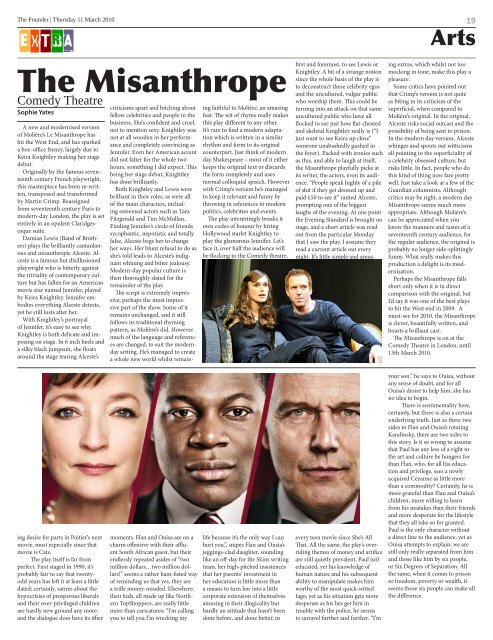HARBEN LETS HL Fashion Show Preview - The Founder
HARBEN LETS HL Fashion Show Preview - The Founder
HARBEN LETS HL Fashion Show Preview - The Founder
Create successful ePaper yourself
Turn your PDF publications into a flip-book with our unique Google optimized e-Paper software.
<strong>The</strong> <strong>Founder</strong> | Thursday 11 March 2010<br />
E X T R A<br />
<strong>The</strong> Misanthrope<br />
Comedy <strong>The</strong>atre<br />
Sophie Yates<br />
A new and modernised version<br />
of Molière’s Le Misanthrope has<br />
hit the West End, and has sparked<br />
a box-office frenzy, largely due to<br />
Keira Knightley making her stage<br />
debut.<br />
Originally by the famous seventeenth<br />
century French playwright,<br />
this masterpiece has been re-written,<br />
transposed and transformed<br />
by Martin Crimp. Reassigned<br />
from seventeenth century Paris to<br />
modern-day London, the play is set<br />
entirely in an opulent Claridgesesque<br />
suite.<br />
Damian Lewis (Band of Brothers)<br />
plays the brilliantly cantankerous<br />
and misanthropic Alceste. Alceste<br />
is a famous but disillusioned<br />
playwright who is bitterly against<br />
the triviality of contemporary culture<br />
but has fallen for an American<br />
movie star named Jennifer, played<br />
by Keira Knightley. Jennifer embodies<br />
everything Alceste detests,<br />
yet he still lusts after her.<br />
With Knightley’s portrayal<br />
of Jennifer, it’s easy to see why.<br />
Knightley is both delicate and imposing<br />
on stage. In 6 inch heels and<br />
a silky black jumpsuit, she floats<br />
around the stage tearing Alceste’s<br />
ing desire for parts in Poitier’s next<br />
movie, most especially since that<br />
movie is Cats.<br />
<strong>The</strong> play itself is far from<br />
perfect. First staged in 1990, it’s<br />
probably fair to say that twentyodd<br />
years has left it at least a little<br />
dated; certainly, satires about the<br />
hypocrisies of prosperous liberals<br />
and their over-privileged children<br />
are hardly new ground any more;<br />
and the dialogue does have its iffier<br />
criticisms apart and bitching about<br />
fellow celebrities and people in the<br />
business. She’s confident and cruel,<br />
not to mention sexy. Knightley was<br />
not at all wooden in her performance<br />
and completely convincing as<br />
Jennifer. Even her American accent<br />
did not falter for the whole two<br />
hours, something I did expect. This<br />
being her stage debut, Knightley<br />
has done brilliantly.<br />
Both Knightley and Lewis were<br />
brilliant in their roles, as were all<br />
of the main characters, including<br />
esteemed actors such as Tara<br />
Fitzgerald and Tim McMullan.<br />
Finding Jennifer’s circle of friends<br />
sycophantic, nepotistic and totally<br />
false, Alceste begs her to change<br />
her ways. Her blunt refusal to do as<br />
she’s told leads to Alceste’s indignant<br />
whining and bitter jealousy.<br />
Modern-day popular culture is<br />
then thoroughly slated for the<br />
remainder of the play.<br />
<strong>The</strong> script is extremely impressive;<br />
perhaps the most impressive<br />
part of the show. Some of it<br />
remains unchanged, and it still<br />
follows its traditional rhyming<br />
pattern, as Molière’s did. However<br />
much of the language and references<br />
are changed, to suit the modernday<br />
setting. He’s managed to create<br />
a whole new world whilst remain-<br />
moments. Flan and Ouisa are on a<br />
charm offensive with their affluent<br />
South African guest, but their<br />
endlessly repeated asides of “two<br />
million dollars…two million dollars!”<br />
seems a rather ham-fisted way<br />
of reminding us that yes, they are<br />
a trifle money-minded. Elsewhere,<br />
their kids, all made up like Northern<br />
TopShoppers, are really little<br />
more than caricatures; “I’m calling<br />
you to tell you I’m wrecking my<br />
ing faithful to Molière, an amazing<br />
feat. <strong>The</strong> wit of rhyme really makes<br />
this play different to any other.<br />
It’s rare to find a modern adaptation<br />
which is written in a similar<br />
rhythm and form to its original<br />
counterpart. Just think of modern<br />
day Shakespeare – most of it either<br />
keeps the original text or discards<br />
the form completely and uses<br />
normal colloquial speech. However<br />
with Crimp’s version he’s managed<br />
to keep it relevant and funny by<br />
throwing in references to modern<br />
politics, celebrities and events.<br />
<strong>The</strong> play interestingly breaks it<br />
own codes of honour by hiring<br />
Hollywood starlet Knightley to<br />
play the glamorous Jennifer. Let’s<br />
face it, over half the audience will<br />
be flocking to the Comedy theatre,<br />
life because it’s the only way I can<br />
hurt you.”, snipes Flan and Ousia’s<br />
jeggings-clad daughter, sounding<br />
like an off-day for the Skins writing<br />
team, her high-pitched insistences<br />
that her parents’ investment in<br />
her education is little more than<br />
a means to turn her into a little<br />
corporate extension of themselves<br />
amusing in their illogicality but<br />
hardly an attitude that hasn’t been<br />
done before, and done better, in<br />
first and foremost, to see Lewis or<br />
Knightley. A bit of a strange notion<br />
since the whole basis of the play is<br />
to deconstruct these celebrity egos<br />
and the uncultured, vulgar public<br />
who worship them. This could be<br />
turning into an attack on that same<br />
uncultured public who have all<br />
flocked to see just how flat-chested<br />
and skeletal Knightley really is (“I<br />
just want to see Keira up close”<br />
someone unabashedly gushed in<br />
the foyer). Packed with ironies such<br />
as this, and able to laugh at itself,<br />
the Misanthrope playfully picks at<br />
its writer, the actors, even its audience.<br />
“People speak highly of a pile<br />
of shit if they get dressed up and<br />
paid £50 to see it” ranted Alceste,<br />
prompting one of the biggest<br />
laughs of the evening. At one point<br />
the Evening Standard is brought on<br />
stage, and a short article was read<br />
out from the particular Monday<br />
that I saw the play. I assume they<br />
read a current article out every<br />
night. It’s little simple and amus-<br />
every teen movie since She’s All<br />
That. All the same, the play’s overriding<br />
themes of money and artifice<br />
are still quietly prevalent. Paul isn’t<br />
educated, yet his knowledge of<br />
human nature and his subsequent<br />
ability to manipulate makes him<br />
worthy of the most quick-witted<br />
Iago, yet as his situation gets more<br />
desperate as his lies get him in<br />
trouble with the police, he seems<br />
to unravel further and further. “I’m<br />
19<br />
Arts<br />
ing extras, which whilst not too<br />
mocking in tone, make this play a<br />
pleasure.<br />
Some critics have pointed out<br />
that Crimp’s version is not quite<br />
as biting in its criticism of the<br />
superficial, when compared to<br />
Molière’s original. In the original,<br />
Alceste risks social outcast and the<br />
possibility of being sent to prison.<br />
In the modern day version, Alceste<br />
whinges and spouts out witticisms<br />
all pointing to the superficiality of<br />
a celebrity obsessed culture, but<br />
risks little. In fact, people who do<br />
this kind of thing now fare pretty<br />
well. Just take a look at a few of the<br />
Guardian columnists. Although<br />
critics may be right, a modern day<br />
Misanthrope seems much more<br />
appropriate. Although Molière’s<br />
can be appreciated when you<br />
know the manners and tastes of a<br />
seventeenth century audience, for<br />
the regular audience, the original is<br />
probably no longer side-splittingly<br />
funny. What really makes this<br />
production a delight is its modernisation.<br />
Perhaps the Misanthrope falls<br />
short only when it is in direct<br />
comparison with the original, but<br />
I’d say it was one of the best plays<br />
to hit the West end in 2009. A<br />
must-see for 2010, the Misanthrope<br />
is clever, beautifully written, and<br />
boasts a brilliant cast.<br />
<strong>The</strong> Misanthrope is on at the<br />
Comedy <strong>The</strong>atre in London, until<br />
13th March 2010.<br />
your son.” he says to Ouisa, without<br />
any sense of doubt, and for all<br />
Ouisa’s desire to help him, she has<br />
no idea to begin.<br />
<strong>The</strong>re is sentimentality here,<br />
certainly, but there is also a certain<br />
underlying truth. Just as there two<br />
sides to Flan and Ouisa’s rotating<br />
Kandinsky, there are two sides to<br />
this story. Is it so wrong to assume<br />
that Paul has any less of a right to<br />
the art and culture he hungers for<br />
than Flan, who, for all his education<br />
and privilege, sees a newly<br />
acquired Cezanne as little more<br />
than a commodity? Certainly, he is<br />
more grateful than Flan and Ouisa’s<br />
children, more willing to learn<br />
from his mistakes than their friends<br />
and more desperate for the lifestyle<br />
that they all take so for granted.<br />
Paul is the only character without<br />
a direct line to the audience, yet as<br />
Ouisa attempts to explain, we are<br />
still only really separated from him<br />
and those like him by six people,<br />
or Six Degrees of Separation. All<br />
the same, when it comes to prison<br />
or freedom, poverty or wealth, it<br />
seems those six people can make all<br />
the difference.














